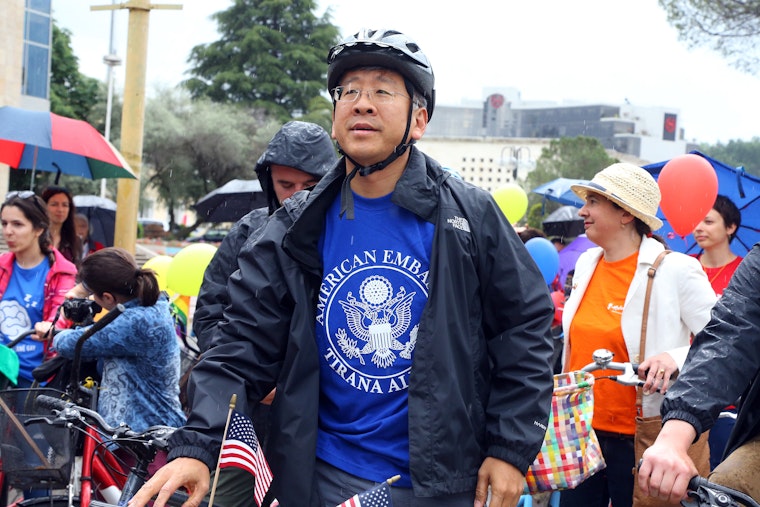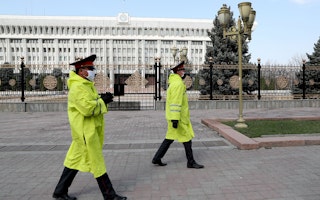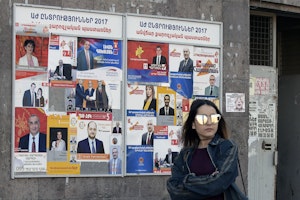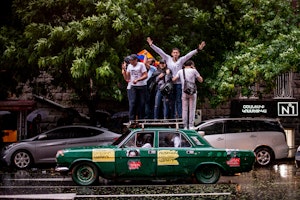A New Ambassador Offers a Chance to Start Again
By Joshua Russell & Aigoul Abdoubaetova

Donald Lu, the new U.S. ambassador to Kyrgyzstan, recently took up residence in Bishkek. Kyrgyzstan, a country with some potential for democratic reforms that is nevertheless often overlooked in U.S. foreign policy. Located in a region where the United States seeks to maintain a foothold and promote stability, Kyrgyzstan sits at the heart of the great powers rivalry between China, Russia, and the United States.
Despite its longtime alliance with Russia—and despite being surrounded by autocracies to its west (Uzbekistan, Kazakhstan, and Tajikstan) and east (China)—it was just last year that Kyrgyzstan held the most democratic elections seen in Central Asia in a generation. Even better: The election led to a peaceful transfer of power, with the former president handing the reins to his prime minister.
While Kyrgyzstan may be a nascent democracy, its human rights record is dismal. The previous government, for example, targeted prominent human rights activists by limiting their rights to free speech and making it difficult for them to travel outside the country. In some cases, the government even went so far as tossing them in prison.
Human rights activists aren’t the only ones to be imprisoned for political reasons, either. In 2017, the government of former President Atambayev threw former Speaker of the Kyrgyz Parliament Omurbek Tekebaev in prison on trumped up charges of corruption. Meanwhile, the new president, Sooronbai Jeenbekov, has not indicated whether or not he will free Tekebaev.
And what Jeenbekov has done is no less disconcerting. In what appears to be an effort to consolidate his power and repress the opposition, he’s jailed several prominent members of the previous government—even including those from within his own party. There’s a reason, in other words, why Omurbek Babanov, the opposition leader and loser of the 2017 election, has fled the country.
This does not mean that Kyrgyzstan has not made some progress. New laws that will go into effect next year will dramatically alter the criminal justice system by decriminalizing a number of minor violations and putting more resources into rehabilitation.
Yet while reform will and must come from within Kyrgyzstan itself, this is an area where Ambassador Lu could help, largely by adopting a policy of greater engagement and stepping in to push for reforms to end corruption, improve government transparency, and strengthen the rule of law. Before Lu can do any of that, however, he must first address the impasse which has strained U.S.-Kyrgyzstan relations for the better part of three years.
In 2015, Kyrgyzstan demanded that the two countries renegotiate a 1993 bilateral agreement which provided the legal framework through which all U.S. economic and humanitarian assistance flowed. Kyrgyzstan’s demand—which was tantamount to ending the agreement—was, in part, a reaction to the State Department’s criticism of its human rights record. (Specifically, the State Department criticized the life sentence being served by Azimjan Askarov, a protester who decried police brutality and the government’s treatment of ethnic minorities.)
Whether or not the two countries can negotiate a new agreement is unclear. President Jeenbekov has done little to engage with the United States and has quickly gone to work building better relationships with China, Turkey, and the European Union. But if the United States is to maintain a meaningful diplomatic presence in the region and push for reforms inside Kyrgyzstan, this lingering dispute must be settled.
Rebuilding its relationship with the United States is in Kyrgyzstan’s interest, too. As it continues its anticorruption efforts and to promote the rule of law, Kyrgyzstan’s government could benefit from U.S. technical assistance. And if the new government is serious about expanding its work in these areas, there’s an opportunity for the United States to provide it with expert and financial support.
Support from the United States could help Kyrgyzstan’s efforts to build a more humane criminal justice system as well. U.S. agencies such as the Department of Justice and the State Department could provide professional expertise to train anticorruption investigators, prosecutors, and legal experts. Similar initiatives could also feature support for new reforms to ensure that the civil rights of people who are imprisoned are protected. But none of this is possible without a new agreement.
Ambassador Lu’s arrival could help arrest Kyrgyzstan’s drift away from democracy. It could also encourage a renewed focus on anticorruption. A better relationship between Kyrgyzstan and the United States, one based on respect for human rights and the rule of law, would not only benefit both countries but the region as a whole. First, however, Lu and Jeenbekov must decide their priorities—and whether they will work together to be a force for stability and freedom in Central Asia.
Joshua Russell is a policy analyst with Open Society-U.S.
Aigoul Abdoubaetova is a visiting fellow in the Central Asia Program at George Washington University.


